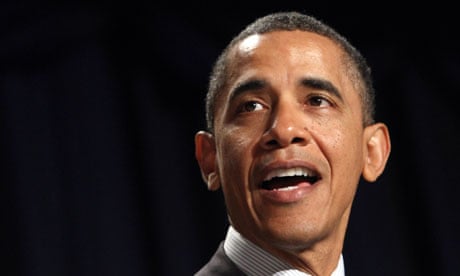Fears that the world recovery is running out of steam were heightened on Friday after the US jobs market stalled for a second month and the eurozone appeared to be slipping further into recession.
Just 115,000 new jobs were created across the US in April, far fewer than the 163,000 in the previous month and well short of the 400,000 that have marked previous recoveries. The unemployment rate fell to 8.1%, but this came as the percentage of the population in the labour force declined, in part because people had stopped looking for work.
Markets slumped on the news as traders prepared for a disappointing 2012. The FTSE fell 1.9% to 5655 and the Dow Jones had slipped 168 points to 13,038 by midday in New York.
The report is expected to rattle nerves at the White House, which has enjoyed a run of positive economic news over the last six months. The US stock market has risen 12% since January.
Weak growth and high unemployment create a formidable challenge for President Barack Obama, who is under pressure from his likely Republican challenger, Mitt Romney, to do more to create jobs.
The Democratic administration will also be concerned at the prospect of a prolonged recession in Europe after most countries in the 17-member eurozone suffered a fall in economic activity in April.
Weak manufacturing output reported a few days ago was matched by a drop in services activity that was only mildly mitigated by stronger than expected retail sales.
Italy led the downturn after its services sector shrank for the 11th consecutive month in April and at its sharpest rate for almost three years. It had already suffered the worst manufacturing numbers for three years.
Analysts said a collapse in consumer spending following cuts in wages, benefits and pensions was behind the fall in output.
They suggested the currency bloc's recession could extend beyond the summer after output also contracted in core countries such as France and the Netherlands along with Italy and Spain. Germany's services sector continued to grow, but at a much slower pace than in March.
The final reading of April's Markit purchasing managers' index (PMI) for the entire eurozone services sector came in at 46.9, a full point lower than the preliminary reading of 47.9 reported two weeks ago, which itself was far weaker than City analysts had expected.
It was the steepest downward revision to the PMI since October 2008, in the aftermath of the Lehman Brothers collapse. Anything less than 50 signifies contraction.
Survey compiler Markit attributed the revision to business conditions worsening at a faster rate towards the end of the month, and said the figure was consistent with a 0.5% quarterly rate of economic contraction.
A dearth of new orders suggested the figures for May could be even worse.
"Little can be said to remain of any 'core' of strength in the region," said Chris Williamson, chief economist at Markit. "Growth has practically ground to a halt even in Germany, and France has joined Italy and Spain in seeing a strong rate of economic decline."
Several eurozone countries are in recession, including Italy, Spain, the Netherlands and Portugal. The UK has also spent the last six months in recession according to figures out last week. Brussels had expressed hope that the recessions would be shallow and shortlived, but recent data points to the eurozone facing deeper woes.
White House economic adviser Alan Krueger shrugged off the weaker jobs data, saying US manufacturing remained strong and consumer spending had gained momentum.
"One month does not a trend make," he said. "I think it makes sense to average the last few months together and the economy continues to go in a positive direction."
